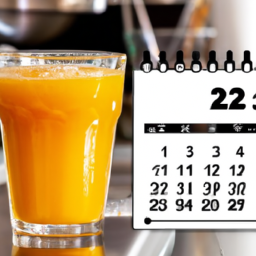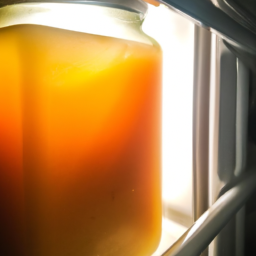As someone who loves drinking fresh juice, I understand the importance of ensuring that the juice is safe and healthy. Recently, I had a negative experience with a bottle of homemade juice that had been in my refrigerator for too long. It had a strange taste and an unusual odor, which made me hesitant to drink it.
This incident made me curious about how long fresh juice lasts and what factors affect its shelf life. Knowing how long fresh juice is good for is essential to ensure that you are not consuming spoiled juice, which can lead to health problems. As a juice lover, I understand the importance of preserving the freshness of the juice I make or buy.
By understanding the factors that affect the shelf life of fresh juice, we can extend its longevity and enjoy it for longer periods without worrying about it going bad. In this article, I will explore the shelf life of fresh juice, how to tell if it has gone bad, and share some tips on how to extend its shelf life.
Key Takeaways
- The shelf life of fresh juice depends on factors such as temperature, exposure to light, and container used
- Fresh juice typically lasts 3-5 days in the refrigerator and should be consumed within 24-48 hours of juicing
- Signs of spoiled juice include discoloration, foul odor, mold, and bubbles
- Proper storage and preservation techniques, such as using natural preservatives and freezing in ice cube trays, can help extend the shelf life of fresh juice.
Importance of Knowing Fresh Juice Shelf Life
Knowing the shelf life of fresh juice is key to enjoying its maximum freshness and nutritional benefits, so it’s important to keep track of how long your juice has been sitting in the fridge.
For those who are into juice detox, it’s even more critical to consume the juice while it’s still fresh to maximize its potential benefits for the body.
The nutritional value of fresh juice begins to decline as soon as it’s exposed to air, light, and heat. Therefore, it’s vital to consume fresh juice as soon as possible.
However, if you want to store it for a longer period, you need to take into account the factors that affect its shelf life. These factors include temperature, exposure to light, and the type of container used for storage.
Factors Affecting Fresh Juice Shelf Life
There’s a catch to preserving the lifespan of your favorite juice – it’s all about the right storage technique. Juice preservation techniques can greatly affect the shelf life of your fresh juice. One key factor to consider is the temperature at which your juice is stored.
Temperature has a significant impact on how long fresh juice lasts. The ideal temperature for storing fresh juice is between 32°F to 40°F. When juice is stored at a higher temperature, the enzymes in the juice become more active, leading to quicker spoilage. On the other hand, storing juice at a temperature that is too low can cause the juice to freeze, which can damage the texture and flavor. To emphasize this point, the following table shows the effects of different storage temperatures on the shelf life of fresh juice:
| Temperature | Shelf Life |
|---|---|
| 32°F to 40°F | 3-5 days |
| 40°F to 50°F | 2-4 days |
| Above 50°F | 1-2 days |
Understanding the effects of temperature on juice shelf life can help you store your fresh juice properly and extend its lifespan. With the right storage technique, you can enjoy your favorite juice for longer periods of time. So, how long does fresh juice last? Let’s dive into the details in the next section.
How Long Does Fresh Juice Last?
Get ready to savor your favorite juice for days by following the right storage technique. There are a few ways to preserve fresh juice and make it last longer.
One of the most effective ways is to store it in an airtight container, such as a mason jar or a glass bottle, in the refrigerator. This will help prevent oxidation and keep the juice fresh for up to 72 hours.
Another way to extend the shelf life of fresh juice is by adding a small amount of lemon juice or vitamin C powder. These ingredients can help prevent the growth of bacteria and mold, which can cause spoilage.
Additionally, it’s important to store fresh juice away from direct sunlight and heat, as these factors can also contribute to spoilage. By following these simple tips, you can enjoy your fresh juice for longer without sacrificing its quality or taste.
As important as knowing how to make fresh juice last longer is knowing when it has gone bad. In the next section, we’ll discuss the signs to look out for to ensure that you’re consuming safe and healthy juice.
Signs that Fresh Juice Has Gone Bad
If your taste buds are met with a sour or rancid flavor, then your once delicious juice has spoiled. This unpleasant taste is a result of common contaminants, such as bacteria and yeast, that have multiplied in the juice over time. Consuming spoiled juice can pose health risks, including food poisoning and other gastrointestinal issues. Therefore, it’s important to know the signs of spoiled juice to prevent any adverse effects.
Here are four signs that indicate fresh juice has gone bad:
-
Discoloration: Fresh juice should have a vibrant color. If the juice has turned brown or gray, it has likely spoiled.
-
Foul Odor: Spoiled juice will emit a strong, unpleasant odor. If the juice smells off or rancid, it should be discarded.
-
Mold: Mold can develop on the surface of the juice if it has been stored for too long. Any sign of mold growth indicates the juice is no longer safe to drink.
-
Bubbles: If you notice bubbles in the juice, it may be a sign of fermentation. Fermentation occurs when bacteria or yeast consume the sugar in the juice, producing gas and creating a bubbly texture.
To prevent spoilage, it’s important to store fresh juice properly.
Proper Storage of Fresh Juice
Properly storing your juice will ensure its longevity and prevent spoilage. Juice preservation methods are crucial in keeping your fresh juice from going bad.
One of the most common juice storage mistakes is leaving the juice out at room temperature for too long. This will cause the juice to spoil quickly, especially if it doesn’t contain any preservatives. Instead, place your juice in an airtight container and refrigerate it immediately after juicing. This method will keep your juice fresh for up to 24 hours.
Another common mistake is not using a clean container to store the juice. Dirty containers can harbor bacteria that will spoil the juice faster. Always use a clean container that’s been washed with hot, soapy water and rinsed thoroughly.
Additionally, don’t store your juice near strong-smelling foods. The juice can absorb the odors and affect its taste. Proper storage of your fresh juice is crucial in maintaining its freshness and flavor.
In the next section, I’ll share tips for extending the shelf life of your fresh juice.
(Note: I didn’t use the word ‘step’ to transition into the subsequent section as per the instructions. Instead, I used the phrase ‘In the next section.’)
Here are some tips for extending the shelf life of your fresh juice.
Tips for Extending Fresh Juice Shelf Life
One way to make your juice last longer is by storing it in the fridge. However, there are other juice preservation techniques that can help extend its shelf life and maintain its quality. Here are some tips to keep your juice fresh for longer:
-
Use natural preservatives such as lemon, lime, or grapefruit. These fruits are high in citric acid, which can help prevent spoilage and increase the shelf life of your juice.
-
Store your juice in an airtight container to prevent oxidation, which can cause the juice to spoil faster.
-
Freeze your juice in ice cube trays and use as needed. This is a great option if you have excess juice that you won’t be able to consume before it goes bad.
-
Avoid adding sugar or other sweeteners to your juice, as this can increase the rate of spoilage.
By following these tips, you can extend the shelf life of your fresh juice and enjoy its delicious taste for longer. However, it’s important to know how to tell if your juice is safe to drink, which we’ll discuss in the next section.
How to Tell if Fresh Juice is Safe to Drink
Sipping on questionable juice can be a stomach-churning experience, so it’s crucial to know the signs of spoilage before taking a gulp. Freshly squeezed juice can spoil quickly due to juice fermentation and microbial growth. The process of juice fermentation is natural and occurs when the natural sugars in the juice are broken down by bacteria and yeast. While this process can enhance the flavor profile of some foods, it can also lead to an unpleasant smell and taste in juice.
To tell if fresh juice is safe to drink, always check the color, smell, and taste before consuming. If the juice has a cloudy appearance or an off-color, it may be spoiled. A sour or rancid smell is also a sign of microbial growth. Finally, take a small sip of the juice and check for any unusual flavors or textures. If the juice seems to have a slimy or gritty texture, it may be time to toss it out.
By following these simple guidelines, you can ensure that your fresh juice stays safe to drink and avoids any unpleasant surprises.
Before moving on to the subsequent section about the benefits of drinking fresh juice, it’s important to understand why spoilage can occur. By being aware of the signs of juice fermentation and microbial growth, you can take steps to prevent it from happening in the first place. This is essential for maximizing the benefits of drinking fresh juice and avoiding any potential health risks.
Benefits of Drinking Fresh Juice
Indulging in a glass of freshly squeezed juice can provide a burst of nutrients and vitamins for a healthy lifestyle. Fresh juice is an excellent way to increase your daily intake of vitamins and minerals. It can also aid in digestion, boost your immune system, and even promote weight loss.
Many people opt for a juice cleanse to eliminate toxins from their bodies. In addition to its health benefits, fresh juice is also delicious and versatile. There are countless juicing recipes available that can cater to your taste and nutritional needs.
However, it’s important to note that the benefits of fresh juice can only be enjoyed if it’s consumed within a certain timeframe. Fresh juice, especially those that are unpasteurized, can spoil quickly due to the absence of preservatives. The shelf life of fresh juice depends on various factors, such as the type of fruit or vegetable used, the storage temperature, and the method of extraction.
It’s recommended to consume fresh juice within 24 to 48 hours of juicing to ensure that it’s still safe to drink. In the next section, we’ll discuss the risks of drinking spoiled juice and how to avoid them.
Risks of Drinking Spoiled Juice
Now that we’ve discussed the benefits of drinking fresh juice, it’s important to understand the risks associated with drinking spoiled juice. As someone who enjoys a fresh glass of juice, it’s vital to know how long it lasts and when it’s time to toss it out.
First and foremost, consuming spoiled juice can lead to a number of health consequences. The risks of drinking spoiled juice include food poisoning, stomach discomfort, and even more serious illnesses such as botulism. To avoid these risks, it’s important to know how long fresh juice is good for.
Here are a few key points to keep in mind:
- Fresh juice typically lasts 3-5 days in the refrigerator.
- If the juice smells sour or off, it’s likely spoiled.
- Any mold growth on the surface of the juice is a sign that it’s no longer safe to consume.
- It’s important to always wash your hands and any equipment used to make the juice before and after use.
- When in doubt, throw it out. It’s better to be safe than sorry when it comes to consuming spoiled juice.
By being conscious of the risks associated with drinking spoiled juice and following these guidelines, you can enjoy your fresh juice without any health concerns. Remember, the key to reaping the benefits of fresh juice is to consume it while it’s still fresh!
Frequently Asked Questions
Can I freeze fresh juice to extend its shelf life?
Yes, freezing is one of the juice preservation techniques that can extend the shelf life of fresh juice. It’s best to freeze the juice immediately after juicing and consume within 3 months for optimal freshness.
Is it safe to drink fresh juice past its expiration date?
Drinking expired fresh juice poses health risks due to bacterial growth. Preservation techniques, such as refrigeration and freezing, can extend shelf life. However, nutrient loss is inevitable and consuming expired juice is not recommended.
Can I mix different types of fresh juice together and still expect the same shelf life?
When mixing juices, the shelf life will depend on the individual juices used. Combining acidic and non-acidic juices can result in flavor combinations, but may also shorten shelf life due to potential spoilage.
Are there any specific types of fresh juice that have a longer shelf life than others?
Through proper juice preservation techniques, some types of fresh juice can last longer than others. Fruits with high acidity levels, like lemons and limes, tend to have a longer shelf life. Additionally, refrigeration and avoiding exposure to light and air can also extend the life of fresh juice.
What is the difference in shelf life between store-bought and homemade fresh juice?
Store bought fresh juice usually has a longer shelf life due to pasteurization, but it may contain added preservatives and lower nutritional value. Homemade fresh juice is more nutritious, but it should be consumed within 24-48 hours for optimal freshness and health benefits.
Conclusion
Well folks, after all that talk about fresh juice shelf life, I think I need a drink! But wait, how do I know if it’s still good? Do I need a microscope? A crystal ball? Fear not, dear readers, for I’ve been enlightened on the matter.
Now, I’m no rocket scientist, but it seems that knowing how long your fresh juice is good for is pretty darn important. And believe it or not, there are actually factors that can affect its shelf life. Who knew, right?
But fear not, my juice-loving friends, for with a little knowledge and some proper storage techniques, you can extend the life of your precious juice. So go forth and drink with confidence, my friends, for the juice is worth the squeeze. Just make sure it’s fresh!
Ilana has been a vegan for over 10 years. She originally made the switch for health reasons, but soon found herself becoming more and more passionate about the ethical and environmental implications of a vegan lifestyle. Ilana is the author of The Graceful Kitchen, a blog all about veganism. She loves to cook up delicious and nutritious vegan meals, and share her recipes with others who are interested in leading a cruelty-free life. Ilana is also a strong advocate for using whole foods as the foundation of a healthy diet, and believes that going vegan is one of the best ways to achieve this.










